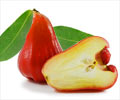Adults who on average ate more than two tomatoes or more than three portions of fresh fruit a day had a slower decline in lung function.
Highlights
"This study shows that diet might help repair lung damage in people who have stopped smoking. It also suggests that a diet rich in fruits can slow down the lung’s natural aging process even if you have never smoked," says Vanessa Garcia-Larsen, assistant professor in the Bloomberg School’s Department of International Health and the study’s lead author. "The findings support the need for dietary recommendations, especially for people at risk of developing respiratory diseases such as COPD."
Study Methods
For the study, the research team assessed diet and lung function of more than 650 adults in 2002, and then repeated lung function tests on the same group of participants 10 years later. Participants from three European countries -- Germany, Norway, and the United Kingdom -- completed questionnaires assessing their diets and overall nutritional intake. They also underwent spirometry, a procedure that measures the capacity of lungs to take in oxygen.
The test collects two standard measurements of lung function: Forced Exhaled Volume in 1 second (FEV1), which measures how much air a person can expel from their lungs in one second; and Forced Vital Capacity (FVC), the total amount of air a person can inhale in 6 seconds. The study controlled for factors such as age, height, sex, body mass index (an indicator of obesity), socio-economic status, physical activity and total energy intake.
Study Results
- A higher total intake of fruits, and of apples in middle-aged adults in Europe, was associated with a slower decline in forced expiratory volume (FEV); which infers to the ability of the lungs.
- The intake of apples, bananas, tomatoes, herbal tea and vitamin C was associated with a slower FVC decline.
- These protective effects are likely of greater impact in those who have quit smoking.
- The possible effect might be due to the presence of antioxidants, flavonoids and vitamin A that are associated with better lung function.
Reference
- Vanessa Garcia-Larsen, James F Potts, Ernst Omenaas, Joachim Heinrich, Cecilie Svanes, Judith Garcia-Aymerich, Peter G Burney, and Deborah L Jarvis. ‘Dietary antioxidants and ten-year lung function decline in adults from the ECRHS survey.’ European Respiratory Journal (2017). 10.1183/13993003.02286-2016.
Source-Medindia











